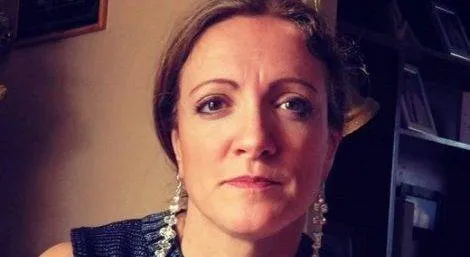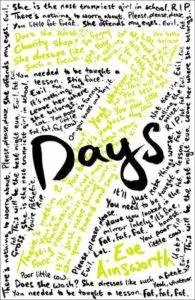
Eve Ainsworth Talks Bullying, Self-Harm, and Writing Teens
At the school library that I manage, we have a Patron of Reading.
A Patron of Reading is an author who pairs up with your school library. Your Patron visits you regularly, donates his or her books to your library, and is an all around book-pushing all star.

Her first book 7 Days takes the perspective of both a student being bullied and the bully themselves.
Crush deals with toxic relationships, and her third book Damage focuses on teens who self-harm.
Eve has a background working with teens in crisis so her books are genuine, informative ,and great to read.
Eve visited our library recently to officially open our Little Free Library and I sat down with her to ask her a few questions about her writing and her books. Enjoy!
Lucas Maxwell: The majority of your books are written from a teenager’s point of view. Do you find it difficult to maintain this perspective?
Eve Ainsworth: Not really. It’s odd. I never planned to write from a teens viewpoint, but when I started writing I was told I had a young voice. I think events from my teenage life have stayed with me and I remember them well. Also working with teens helped to keep the voice fresh and real (I hope)
I don’t think I’ve ever grown up, to be honest!
LM: In 7 Days, you focus on both the person being bullied as well as the bully. Do you think the hyper-awareness we now have of bullying has resulted in its decline or has online culture created a whole new animal to contend with?
EA: I think bullying is still a huge problem and we probably underestimate by how much. There is still a stigma about ‘being bullied’ and young people struggle to speak out about it. Also the online culture has created a different dynamic with people thinking they can hide behind their screens whilst dishing out abuse or threats to others. I see the problem as being far more complex now and very difficult to deal with.
LM: In Crush, you write about a teenager in a toxic relationship. What do you think both girls and boys should be aware of when entering into the world of relationships and “first loves”?
EA: All relationships need to be built on trust and respect and its important that this is in place first before anything can grow, it’s the key foundations. Teenagers should ensure that they still have space in the relationship to ‘be themselves’ and have time to spend time with their friends, family and doing other things they enjoy. A relationship add to your life, but it should never consume it.
LM: In your most recent novel Damages, the protagonist harms herself. Do you feel self-harm is still a taboo topic?
EA: Yes, very much. People still think that self harm is attention seeking or only something that someone with a mental illness would do. And whilst, yes in some instances this can be the case, in many it is. Self harm is often an outlet, a way of releasing inner pain. By understanding and dealing with that pain, we can help a lot of sufferers.
LM: Did your research for Damages result in any information that surprised you regarding self-harm?
EA: Yes, the sheer amount of teens that do self harm. And we still don’t know the true figures as many do not report it.
LM: The web site Selfharm UK says that since 2014 there has been a 70% increase in 10-14 year olds who self-harm. If you were able to speak to a group of teens who were taking part in self-harm, what advice would you give?
EA: To seek help. To speak to a professional, to someone you trust. It’s an addictive, corrosive pattern of behaviour and you will need help breaking the pattern. There is so much help available – but you need to be able to reach out and seek it.
LM: What do you think the biggest barrier is for teens who are suffering from the problems that you’ve written about in your books?
EA: Talking about it. Sometimes there is shame in admitting what they are going through. Sometimes there is fear. Often they can feel misunderstood or judges. By talking to others you will see that you are not alone. This is why books can help – they break down the divides and open up discussions.
LM: Do you think you’ll always want to write about real issues that face teens or do you have a desire to go completely off-road and write in a different style or genre?
EA: I never say never 😉
LM: Can you credit one person that made you interested in writing, or writing about these particular topics?
EA: My Dad gave me an interest in writing from a young age. I can’t really say who gave me an interest in these topics, perhaps early books by Jaqueline Wilson.
LM: Finally, and I ask this of every author I interview, you’re forced to live forever with a television family, who do choose? (Holly Bourne chose Gilmore Girls)
EA: Wow that’s a tough one – maybe the Gellers in Friends!









